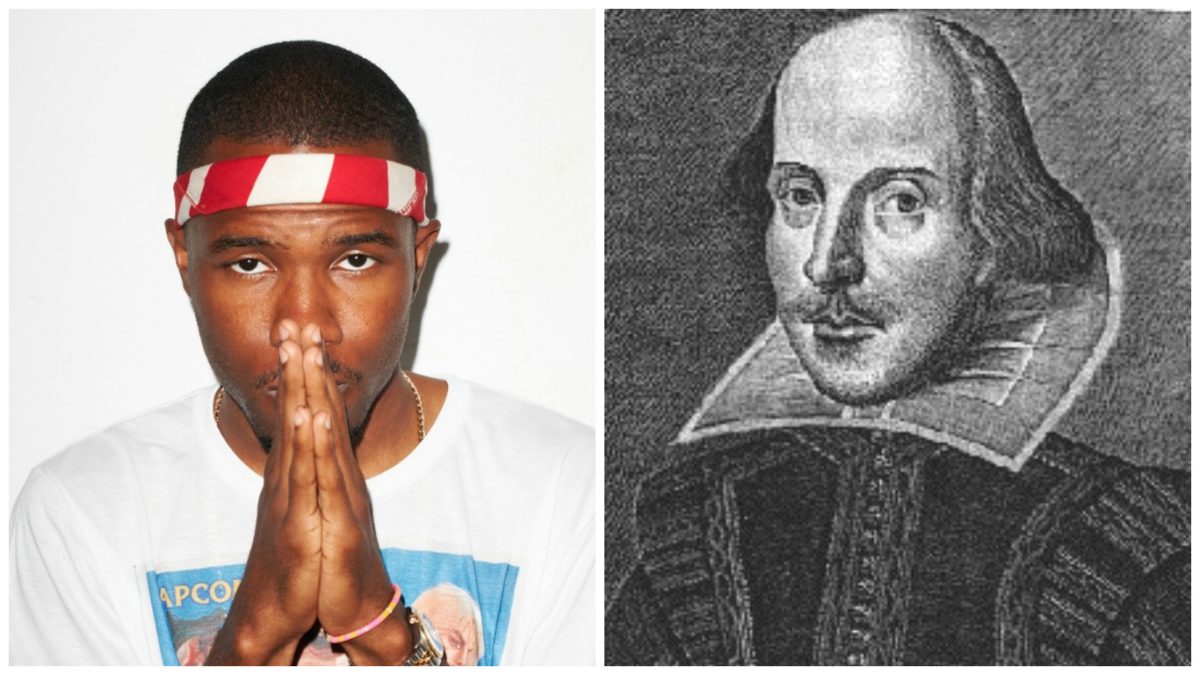Nonfiction Intersections
Channeling William
Similarities between Shakespeare’s Sonnets and Frank Ocean’s Channel Orange
Maybe it’s the fact that Frank Ocean announced his new album via library due date slip that has me all of a sudden thinking about him in a literary sense.
Frank Ocean changed the tide of hip hop music with Channel Orange . In a largely homophobic industry, he put himself out there as a bisexual artist, unwilling to hide behind a heteronormative guise for the sake of his music’s honesty. Sound familiar?
No? It doesn’t sound exactly like William Shakespeare to you? Well, allow me to explain, then.
Though some stuffy, close-minded Shakespeare nerds will try to argue otherwise, no, he didn’t pour his heart and soul out into 126 of his sonnets for someone he considered “just a friend.” Shakespeare was bisexual. Professor Stanley Wells, President of Shakespeare Birthplace Trust confirms that this is the case .
While he married Anne Hathaway (no, not that Anne Hathaway ) and fathered three of her children, his sonnets show intense longing for a man who is known as the Fair Youth.
The public need not speculate or argue about Frank Ocean’s sexuality. He came out as bisexual on June 4, 2012 in a Tumblr post , stating that he was in love with another man when he was 19.
As dueling manifestos on the woes of being a bisexual man, Frank Ocean’s Channel Orange and Shakespeare’s sonnets have striking similarities.
Shakespeare addressed some of his sonnets to the Fair Youth, and others to the Dark Lady.
The Fair Youth, rumored to be the same man that the sonnets are dedicated to, was supposedly the picture of beauty, someone who would have made a beautiful woman until Mother Nature “prick’d thee out for women’s pleasure” (Sonnet 20). By the way, in case you missed it–that was Shakespeare making a penis joke.
Ocean’s male protagonist, discussed on “Forrest Gump,” is also a model of male perfection. Although he is “buff,” Ocean also croons that he “wouldn’t hurt a beetle.”
In Sonnet 20, Shakespeare also notes the captivating nature of the Fair Youth: “A man in hue all hues in his controlling/ Which steals men’s eyes and women’s souls amazeth.”
Speaking of hues, Frank Ocean gives us his take on the hues while discussing his own Fair Youth: “Forrest green/ Forrest blues/ I remember you.”
Shakespeare’s Dark Lady, on the other hand, did not meet the beauty standards of the day. In Sonnet 130, he writes, “My mistress’ eyes are nothing like the sun;/ Coral is far more red than her lips’ red/ If snow be white, why then her breasts are dun;/ If hairs be wires, black wires grow on her head.”
Ocean’s Dark Lady of the song “Pyramids” has similarly dark features: “Found my black queen Cleopatra/Bad dreams Cleopatra.”
Shakespeare hints that the Dark Lady is a temptress and possibly an immoral person in Sonnet 144: “ To win me soon to hell, my female evil,/ Tempteth my better angel from my side.” Shakespeare scholars have taken these implications a step further to speculate that this woman was actually infamous London prostitute Lucy Negro.
Not that stripping and prostitution are the same thing, but they both deal heavily in the art of temptation and seduction. He goes on to imply the profession of Cleopatra, which is probably just a stage name: “Then put your panties on in the mirror, Cleopatra/Then your lipstick, Cleopatra/Then your six inch heels/Catch her/She’s headed to the pyramid/She’s working at the pyramid tonight.”
Beyond their love interests, both men seem to have philosophical questions about human reproduction. In Sonnet 3, Shakespeare writes: “Though dost beguile the world, unbless some mother/For she is so fair whose uneared womb/ Disdains the tillage of thy husbandry?”
In “Pink Matter,” Ocean sings, “Sensei replies, what is your woman/ Is she just a container for the child/That soft pink matter…”
Finally, like all great artists, both men have beef with a contemporary of theirs. Within the series of sonnets directed at the Fair Youth, some mention a Rival Poet who comes in and sweeps the Youth off his young, perfect feet: “ Was it the proud full sail of his great verse,/Bound for the prize of all too precious you,/That did my ripe thoughts in my brain inhearse,/Making their tomb the womb wherein they grew?” (Sonnet 86)
Ocean doesn’t have anyone standing in the way of his heart, but he did have someone in the way of his parking space–none other than Chris Brown himself. During a dispute over the spot, a member of Chris Brown’s crew allegedly called Ocean a homophobic slur. This happened after Channel Orange, but Ocean gets into it on an Earl Sweatshirt track, “Sunday.”
With the new addition of Frank Ocean’s album, Boys Don’t Cry , we’re about to see just how Shakespearean hip hop can get.
